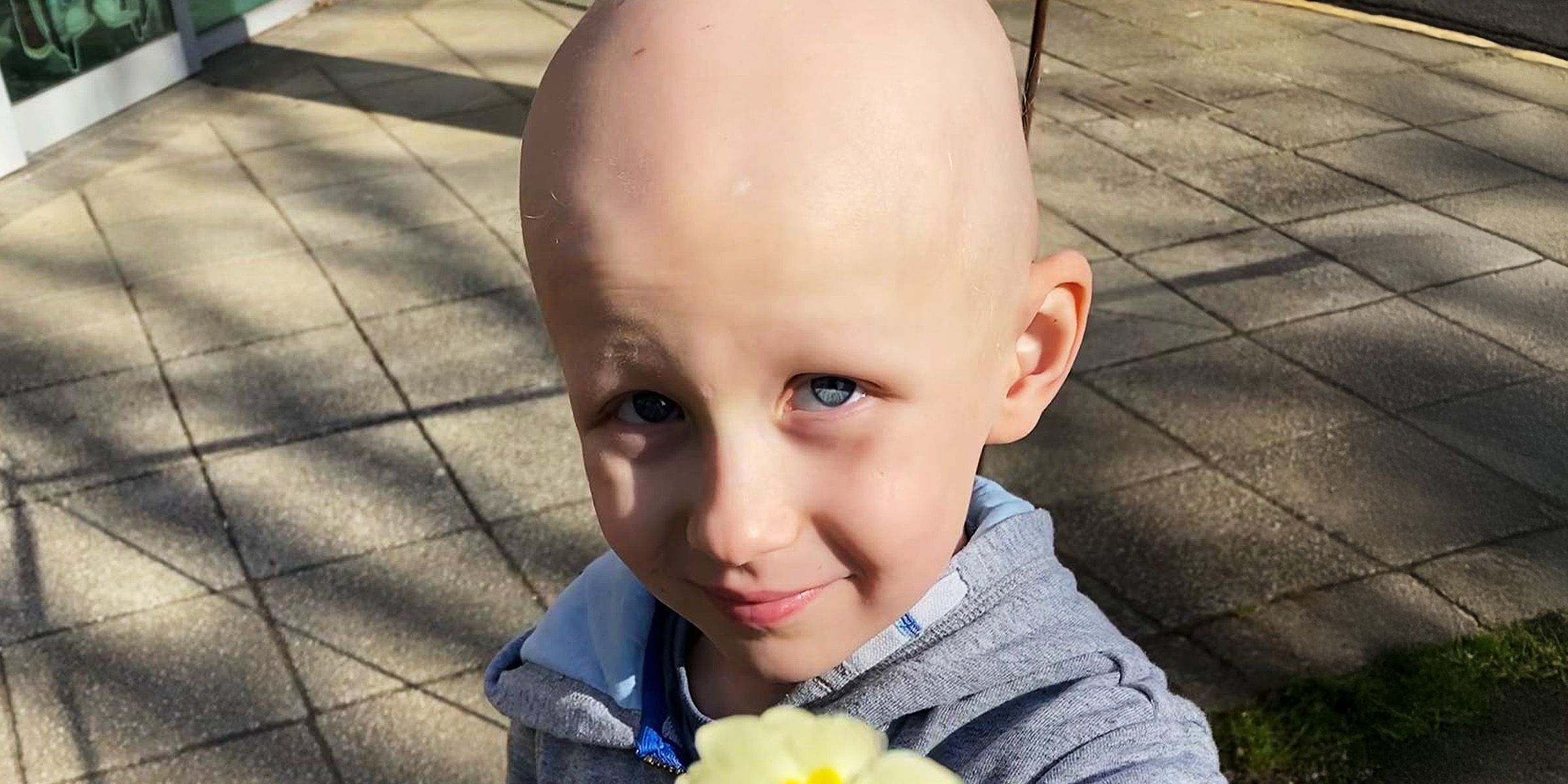
A 6-Year-Old Boy Died from Cancer Just Months After Showing a Single Symptom That Is Common in Children
They thought it was just a stomach bug. Even when Hugh seemed more tired than usual, they blamed it on a long day of play. But when the swelling didn't go away, further tests revealed the unthinkable.
Hugh Menai-Davis was five years old when his parents noticed that his stomach seemed swollen. However, they didn't panic. Even their doctor reassured them it was likely just a passing virus. But what started as a harmless symptom led to a string of late-night hospital visits, invasive procedures, and a diagnosis his parents never saw coming.
Over the next 11 months, Hugh endured multiple rounds of treatment and short-lived signs of recovery. By the time doctors confirmed the cancer had returned, there was nothing left to do. Nearly four years later, his parents still share his story, not for sympathy, but to make sure others don't miss the one sign that could save a child's life.
Symptom Presentation to Final Diagnosis
In the autumn of 2020, Hugh's parents, Frances and Ceri Menai-Davis, noticed that his stomach looked bloated. They believed he had a stomach bug, and when he began feeling more tired than usual, they assumed it was from playing all day.
A visit to the family's general practitioner (GP) seemed to confirm their suspicions. The doctor believed it was a virus and said it would likely pass in a few days. But the swelling didn't go away. Concerned that something more serious was going on, the family pushed for further examination.
On October 23, 2020, they took Hugh to the hospital, thinking it might be appendicitis. That evening, Frances spoke to a consultant who reassured her that Hugh was "a smily boy" and that there was "nothing to worry about." At the time, there were no indications of what lay ahead.
By 2 a.m. the following morning, everything changed. Frances was told that Hugh had cancer. Ceri rushed to the hospital, where they were brought into a dark room. The medical team, masked due to COVID-19 protocols, informed them that Hugh had cancer, but they were unsure where it had originated.
At 3 a.m., Hugh was transferred by ambulance to Addenbrooke's Hospital in Cambridge for further assessment. Frances rode in the ambulance with Hugh while Ceri followed alone in the car behind them. Once admitted, Hugh was placed under observation and put on a nil-by-mouth regimen in preparation for a series of urgent tests.
In the days that followed, he was scheduled for a biopsy, a lumbar puncture, and the insertion of a Hickman line, used to administer chemotherapy. His condition began deteriorating rapidly. His abdomen expanded significantly, and the pressure made it difficult for him to breathe on his own. He was put on oxygen support as his medical team raced to stabilize him.
On the Wednesday after his admission, Hugh was taken into surgery. Ceri later described walking into his son's hospital bay on ward D2 and seeing a female oncologist lying next to Hugh on the bed, holding his hand and explaining the procedure.
For Ceri, that moment marked a shift. "This was real and this was happening," he wrote. Later that day, the parents met a consultant in the hospital's garden. "I'm sorry," the doctor began. "This isn't in the parents' handbook."
On Friday, test results confirmed that Hugh had rhabdomyosarcoma. It is a soft tissue sarcoma that develops in skeletal muscle. Although rare, it is one of the most common types of soft tissue cancer in children. It most commonly appears in the head, neck, or chest, but can also develop in the abdomen, as it had in Hugh's case.
Between 400 and 500 cases are diagnosed annually in the United States. Some forms are more aggressive than others and may respond to treatment, but the cancer can recur even after remission. The symptoms often depend on the location of the tumor.
Tumors in the abdomen, like Hugh's, may cause bloating, constipation, or vomiting. In other parts of the body, rhabdomyosarcoma can cause nosebleeds, lumps, swelling, or pain. Because many of these symptoms mimic everyday childhood illnesses, the disease is frequently misdiagnosed or detected late.
Treatment typically involves a combination of chemotherapy, radiation, and sometimes surgery. While many children respond well to initial treatment, with a five-year survival rate of around 70 percent, the cancer often returns. The survival rate for adults is significantly lower, at 20 percent.
Frances was asked to sign the consent documents allowing Hugh to begin treatment. The paperwork included a list of risks and possible side effects. That weekend, Hugh started chemotherapy using the IVADO protocol, a combination of Ifosfamide, vincristine, actinomycin, and doxorubicin.
Treatment and Temporary Recovery
After beginning treatment in late October 2020, Hugh's condition stabilized enough for him to be discharged from Addenbrooke's Hospital on November 17. His father remembered that time vividly, "Hugh was quite literally jumping around the house, so we thought we were winning."
Over the next six months, Hugh returned to the hospital every three weeks for more rounds of intensive chemotherapy. His treatment continued with a 16-week course of radiotherapy, aimed at targeting what remained of the tumor. Despite the physical toll of the regimen, Hugh endured it without complaint.
"He never moaned or complained, he just got on with it," his father said. "He faced everything with innocence and ignorance, and he was just amazing."
As his sixth birthday approached, Hugh completed his treatment. On May 23, 2021, he rang the bell to mark the end of his cancer therapy. The moment was significant for the family.
In a post shared years later, Ceri wrote, "You can see by our face masks, how much it meant to us, the tears rolling down our faces and how much Hugh holds on to Frances so tightly, and Frances on to Hugh." At the time, the family believed Hugh had entered recovery.
Relapse and Final Days
Just three and a half months after Hugh rang the bell, a follow-up scan revealed that the cancer had returned. The news came without warning. This time, doctors informed the family that there were no remaining treatment options.
"When we were told that Hugh was dying," Ceri recalled, "they put a box of tissues behind us and told us that that was it. I asked the question: 'What do I do now?'" Hugh's condition deteriorated quickly. His abdomen filled with fluid, putting pressure on his lungs until he could no longer breathe on his own.
He was placed on oxygen support once more. His parents, already devastated, chose not to tell him that he was dying. "Fear is learned, so we didn't want to show him any weakness," Ceri said. "We never told him that he wouldn't be alright."
On September 18, 2021, Hugh passed away at just six years old. His parents later described him as a giving and caring child. "He didn't deserve it," Ceri stated. "No child deserves it."
Legacy: It's Never You and Hugh's Law
After Hugh's death, Frances and Ceri created a charity in his name. The first words Frances had spoken after hearing his diagnosis — "You always think it's someone else's child, never you" — became the organization's name: "It's Never You."
The charity was founded to support other parents of children with cancer and to provide the kind of emotional and practical help they needed but didn't have. The organization offers a free mobile app that connects parents with more than 70 child cancer support charities and resources.
The app includes tools for financial guidance, mental health support, nutritional advice, and peer-to-peer communication. According to the charity's official site, "It's Never You" aims to make sure that no parent navigating a cancer diagnosis feels isolated, overwhelmed, or unsupported.
In 2025 alone, the charity raised over $50,000. To help raise funds and awareness, Ceri ran the London Marathon carrying a 20kg rucksack, Hugh's approximate weight.
On May 21, he marked the fourth anniversary of Hugh's bell-ringing ceremony, writing, "We thought we were winning. That we were nearly there. That a future was within touching distance."
On June 1, 2025, Ceri announced that he would once again carry the same weight during a 250km walk planned for September. "It's not just a bag," he wrote. "It's the weight of Hugh. The weight of all the children. Of all the love. Of all the grief. To walk without it wouldn't feel right."
Outside of charity work, the Menai-Davis family is also lobbying for political reform. In February 2025, Ceri launched a campaign to pass Hugh's Law, which calls for guaranteed financial support for parents of seriously ill children.
In the current UK system, parents must rely on Universal Credit, Carer's Allowance, or Disability Living Allowance, options that Frances and Ceri describe as inadequate. Hugh's Law proposes support equal to Statutory Maternity Pay. This will help parents remain by their child's side without the added pressure of income loss.
They are working with MP Sir Oliver Heald to promote the legislation and are asking the public to support the petition. "No parent should have to face the heartbreak of watching their child suffer," Ceri wrote, "and beyond the emotional pain, families also face a financial crisis."
In the wake of sharing Hugh's story, an outpouring of public support followed. Strangers, moved by his courage and his family's strength, left messages that echoed one another in sorrow and solidarity. "Poor baby. Rest in paradise little man," one wrote.
Another added, "Tragic — what a beautiful child. Heartfelt condolences." One shared, "Heartbreaking. Poor boy going through that painful treatment. May he rest in peace."
One supporter mourned, "A beautiful little boy who had his whole life before him makes me want to cry. Surely, tiredness and a bloated stomach in anyone, never mind a child, should be immediately checked out with tests. Heartbreaking for the family. Good Luck, Dad."
Others said, "So heartbreaking. My condolences to his family," and, "What a tragic story! Such a beautiful and courageous little boy. My heart goes out to his devoted parents."
For Frances and Ceri, those words matter. Not just because they affirm Hugh's short but mighty life, but because they signal that people are paying attention. And that's all they want: for others to notice what they almost missed.
A bloated stomach. A little fatigue. The smallest signals that, in Hugh's case, were signs of something devastating. They can't change what happened to their son, but they can make sure his story doesn't end in silence.
The information in this article is not intended or implied to be a substitute for professional medical advice, diagnosis or treatment. All content, including text, and images contained on news.AmoMama.com, or available through news.AmoMama.com is for general information purposes only. news.AmoMama.com does not take responsibility for any action taken as a result of reading this article. Before undertaking any course of treatment please consult with your healthcare provider.
